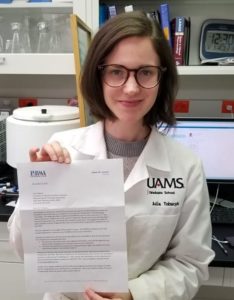PTET Track Overview

The PTET Track is designed to offer Ph.D. students a broad-based education to prepare for a career in translational research within academia, industry, or government. Our program emphasizes identifying mechanisms of disease as a basis for identifying new drug targets and evaluating potential medications in vivo as the first step to medication development. The PTET Track within GPIBS includes 53 faculty in the basic science and clinical departments in the College of Medicine, and faculty in the Colleges of Pharmacy and Public Health. Training sites include the UAMS campus, the Arkansas Children’s Research Institute (ACRI) and the FDA National Center for Toxicological Research (NCTR). Our faculty have a long history of graduate research training focused on pharmacology and toxicology in diverse specialties including behavioral and substance abuse, cardiovascular and renal disease, cancer and carcinogenesis, and ischemic neurological disorders and retinal injury.
Graduate students have trained at NCTR, and 13 researchers there have adjunct appointments at UAMS through the Department of Pharmacology and Toxicology. A recent Memorandum of Understanding (MOU) between the State of Arkansas and the FDA has made collaborations in graduate education between UAMS and NCTR even easier.
Program of Study
Students complete a core curriculum in Semester 1, join the PTET track in Semester 2, and complete the curriculum outlined below. At the end of Year 2, students will take a candidacy exam that includes a written and oral component to officially be a candidate for the doctoral degree. Students will then continue work with their research mentor. Their research project must be defended in a written and oral format prior to awarding of the doctoral degree. All of our students currently receive a $30,000 yearly stipend and we pay tuition!
Year 1, Fall Semester
GPIBS Core Curriculum
1 credit hour GPIBS Seminar (IBSD 5102)
1 credit hour Scientific Communications and Ethics I (PCOL 5117)
3 credit hours Biochemistry and Molecular Biology (BIOC 5101)
3 credit hours Cell Biology (NBDS 5111)
3 credit hours Gene Expression (PHYO 5112)
1 credit hour Research (IBSD 5101)
Year 1, Spring Semester
1 credit hour Seminar (PCOL 5109)
1 credit hour Scientific Communication and Ethics II (PCOL 5119)
3 credit hours Principles and Methods of Pharmacology and Toxicology (PCOL 5105)
3 credit hours General Physiology (PHYO 5103)
1 credit hour Journal Club (PCOL 5115)
1 credit hour Research (PCOL 5103)
Year 2, Fall Semester
1 credit hour Seminar (PCOL 5109)
3 credit hours Graduate Pharmacology and Therapeutics (PCOL 5107)
1 credit hour Scientific Communication and Ethics III (PCOL 5120)
3 credit hours Elective (choose to take in Fall or Spring of 2nd year)*
1 credit hour Journal Club (PCOL 5115)
1 or 4 credit hours Research (PCOL 5103) (based on taking elective or not)
Year 2, Spring Semester
1 credit hour Seminar (PCOL 5109)
1 credit hour Scientific Communications and Ethics IV (PCOL 5121)
3 credit hours Elective (choose to take in Fall or Spring of 2nd year)*
3 credit hours Experimental Design & Quantitative Analysis (PCOL 5143)
1 credit hour Journal Club (PCOL 5115)
1 or 4 credit hours Research (PCOL 5103) (based on taking elective or not)
*The elective must include three additional course credit hours based on advice from the student’s mentor and/or advisory committee. Clinical Toxicology (PCOL 6102) or Systems Therapeutics (PCOL 6101) are highly encouraged.
Year 2, Summer
Candidacy Exam (research proposal submitted to committee followed by oral defense)
Years 3, Degree Completion
Students will enroll in 1 credit hour Seminar (PCOL 5109) for each of the remaining semesters and 9 credit hours of Dissertation Research (PCOL 5123) (until reach 18) an/or Research.
Graduate Certificate in Regulatory Sciences
Pharmacology/Toxicology students can also opt to take courses geared toward earning a Certificate in Regulatory Science (offered through the College of Public Health/Dept. of Environmental and Occupational Health). The Graduate Certificate in Regulatory Science consists of 12 semester credit hours with courses in current regulatory statutes, safety assessment, clinical trials design and management, and data quality requirements for regulatory decision-making. Please speak to the program directors or refer to the College of Public Health website for more about this program.
